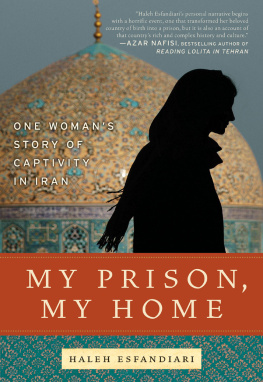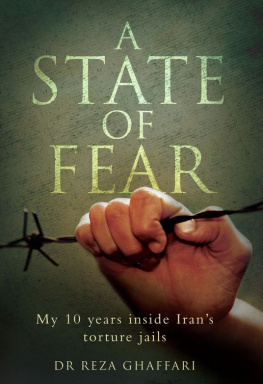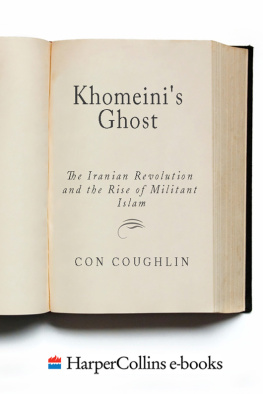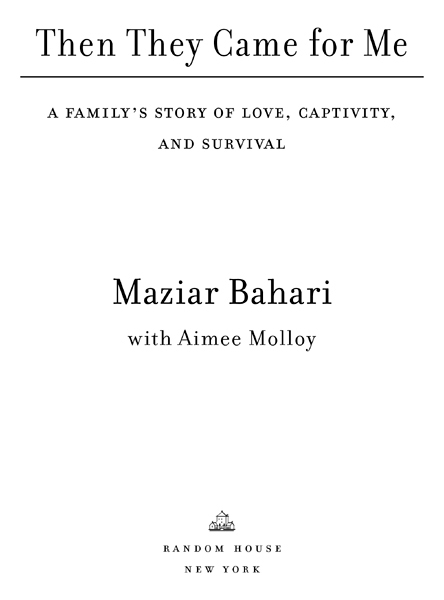Copyright 2011 by Maziar Bahari
All rights reserved.
Published in the United States by Random House,
an imprint of The Random House Publishing Group,
a division of Random House, Inc., New York.
R ANDOM H OUSE and colophon are registered trademarks of Random House, Inc.
Grateful acknowledgment is made to the following for permission to reprint previously published material:
Arcade Publishing, an imprint of Skyhorse Publishing, Inc.: Translation by Ahmad Karimi Hakkak of In This Blind Alley by Ahmad Shamlou. Published by arrangement with Arcade Publishing, an imprint of Skyhorse Publishing, Inc.
Maryam Dilmighani: Translation of The Wind Will Carry Us by Forough Farrokhzad.
Reprinted by permission of Maryam Dilmaghani.
Sony/ATV Music Publishing: Excerpt from Sisters of Mercy by Leonard Cohen, copyright 1967 by Sony/ATV Songs, LLC. All rights administered by Sony/ATV Music Publishing LLC, 8 Music Square West, Nashville, TN 37203. All rights reserved. Used by permission.
Wixen Music Publishing, Inc.: Excerpt from Everybody Knows by Leonard Cohen, copyright 1988 by Sharon Robinson Songs (ASCAP), administered by Wixen Music Publishing, Inc. All rights reserved. Used by permission.
Library of Congress Cataloging-in-Publication Data
Bahari, Maziar.
Then they came for me : a familys story of love, captivity, and survival / Maziar Bahari with Aimee Molloy.
p. cm.
eISBN: 978-0-679-60419-8
1. Bahari, Maziar. 2. Bahari, MaziarImprisonment. 3. Bahari, MaziarFamily. 4. IranHistory1997 Biography. 5. IranPolitics and government1997 6. Political prisonersIranBiography. 7. JournalistsIranBiography. 8. JournalistsCanadaBiography. 9. Motion picture producers and directorsCanadaBiography. I. Molloy, Aimee. II. Title.
DS318.9.B35 2010
365.45092dc22
[B]
2010053882
www.atrandom.com
Jacket design: Misa Erder
Jacket photograph: Shutterstock
v3.1
To Moloojoon, Baba Akbar, Maryam,
Paola, and Marianna
They smell your breath
lest you have said: I love you,
They smell your heart:
These are strange times, my dear.
They chop smiles off lips,
and songs off the mouth.
These are strange times, my dear.
A HMAD S HAMLOU , 1979
Contents
PART ONE
The Tunnel at the End of the Light
PART TWO
Neither Departed Nor Gone
PART THREE
Survival
Prologue
I could smell him before I saw him. His scent was a mixture of sweat and rosewater, and it reminded me of my youth.
When I was six years old, I would often accompany my aunts to a shrine in the holy city of Qom. It was customary to remove your shoes before entering the shrine, and the caretakers of the shrine would sprinkle rosewater everywhere, to mask the odor of perspiration and leather.
That morning in June 2009, when they came for me, I was in the delicate space between sleep and wakefulness, taking in his scent. I didnt realize that I was a man of forty-two in my bedroom in Tehran; I thought, instead, that I was six years old again, and back in that shrine with my aunts.
Mazi jaan, wake up, my mother said. There are four gentlemen here. They say they are from the prosecutors office. They want to take you away. I opened my eyes. It was a few minutes before eight, and my mother was standing beside my bedher small eighty-three-year-old frame protecting me from the four men behind her. I sleep without clothes, and in my half-awake state, my first thought wasnt that I was in danger, but that I was naked in a shrine. I felt ashamed and reached down to make sure the sheets were covering my body.
Mr. Rosewater was standing directly behind my mother. I would later come to learn a lot about him.
He was thirty-one years old and had earned a masters degree in political science from Tehran University. While at university, he had joined the Revolutionary Guards, a vast and increasingly powerful fundamentalist military conglomerate formed in the wake of the 1979 Iranian revolution. I would come to know that his punches were the hardest when he felt stupid. But when he appeared in my bedroom early that morning, the only things I understood about him were that he was in charge, and that he had a very large head. It was alarmingly big, like the rest of his body. He was at least six foot two and fat, with thick glasses. Later, his glasses would confuse me. I had associated glasses with professors, intellectuals. Not torturers.
I wrapped the sheet tightly around my body and sat up. Put some clothes on, Rosewater said, motioning to the three men behind him to leave the room so that I could get dressed. I found comfort in this: whatever their reason was for barging into my house, he was still respectful, still behaving with a modicum of courtesy.
They kept the door slightly ajar, and I walked to my closet. Things were beginning to come into clearer focus, but his rosewater scent lingered and my thoughts, still confused, remained back in the past, at the shrine. What does one wear in a shrine? Whats the best way to present oneself? I had just finished putting on a blue collared shirt and a pair of jeans when the men pushed their way back into my room: Rosewater and another man, who wore a shiny silver sports jacket and a cap.
They circled the room, surveying everything. I had been spending most of my time over the last two years with my fiance, Paola, in London. We had gotten engaged six months earlier, and had been preparing for the birth of our child in four months time, and I had never really settled in at my mothers house. I could sense their frustration as they took stock of the mess in my small room. Heaps of books sat on the floor beside stacks of videotapes and DVDs and an untidy pile of laundry. I had not organized my desk for months, and it was covered with old newspapers and notebooks. All journalists working in Iran have to be accredited by Ershadthe name is shorthand for the Ministry of Culture and Islamic Guidanceand I had given my mothers address as my place of work. Theyd thought they were going to find an office at my mothers house. Instead, they were picking through piles of underwear.
If you want, I can organize things and you can come back tomorrow, I said with an apologetic smile.
Zerto pert nakon, Rosewater said sharply. Stop talking shit. Sit down and shut up. One more word, and Ill beat you so badly, Ill make your mother mourn for you. He scratched his side under his jacket, revealing the gun strapped to his body. I sat down, feeling my body grow heavy with fear. I, like most Iranians, knew of far too many peoplewriters, artists, activistswho had been woken up like this, then taken somewhere and murdered. I thought of my father and my sister, each arrested and imprisoned by previous regimes; I thought of my mother, who had been forced to live through all this twice before. I could hear my mothers voice in the kitchen, and my fear was joined by an overwhelming sense of guilt. How could my mother go through this again? Why hadnt I been more careful? Why hadnt I left Iran sooner?
Would you like some tea? I heard her ask one of the men in the kitchen.
No, thank you.
Why not? It seems that you are going to be here for a while. You should have some tea, she said.
No, really. I dont want to impose.
I heard my mother laugh. You arrived at my house at eight A.M. You are going through my sons personal belongings. I am going to have to put everything back in order after you leave. What do you mean you do not want to impose?


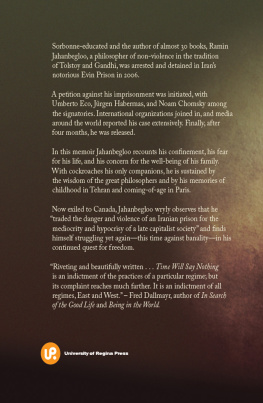
![HMP Belmarsh - A prison diary. [Volume one. Belmarsh: hell]](/uploads/posts/book/212654/thumbs/hmp-belmarsh-a-prison-diary-volume-one.jpg)
